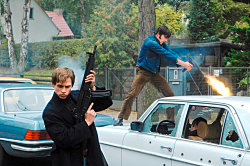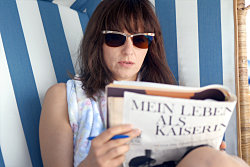LondonNet Film Review
Film in German with English subtitles
Popular on LondonNet
Paranoia and violence rocked Germany in the 1970s, when a fragile democracy struggled against militant resistance from children of the Nazi generation. Andreas Baader, Ulrike Meinhof and Gudrun Ensslin led the Red Army Faction in murders and bombings they believed would end the country’s ‘new fascism’ – its ties to American imperialism maintained by the German establishment, itself scattered with former Nazi Party members…
Meinhof, a well known writer with a crumbling marriage, is drawn to action after interviewing Ensslin, who (along with her boyfriend Baader) is in prison for orchestrating a department-store arson to protest the Vietnam War. Meinhof stops believing her words have enough power to change. Over a few years, she gives up “her children, her career, her entire existence in order to change the world with a Kalashnikov,” in the words of the actress who plays her, Martina Gedeck (The Lives of Others, The Good Shepherd).
The radical group designed to fight authoritarianism eventually becomes authoritarian itself. Large-scale bank robberies, office-complex blowups and even exercises at a Jordanian terrorist training camp dissolve trust, with Baader’s (Moritz Bleibtreu’s) volatile egotism head-butting Meinhof’s intellectual strategising. And while members of the leftist gang are psychologically unravelling, a massive police manhunt is slashing the group’s foundation.
 The Baader Meinhof Complex has sparked controversy in its native Germany, with gang victims, children of gang members and even Meinhof’s daughter branding the film a shamelessly violent two-and-a-half hours of “hero worship”. Director Uli Edel says despite scenes that could elicit an eye-cover from Bruce Willis, the film is meant (like the Stephen Aust book of the same name) to explore the RAF era without taking sides.
The Baader Meinhof Complex has sparked controversy in its native Germany, with gang victims, children of gang members and even Meinhof’s daughter branding the film a shamelessly violent two-and-a-half hours of “hero worship”. Director Uli Edel says despite scenes that could elicit an eye-cover from Bruce Willis, the film is meant (like the Stephen Aust book of the same name) to explore the RAF era without taking sides.
Gedeck is sympathetic in her portrayal as a pushed-to-her-limit Meinhof, though Johanna Wokalek stands out as a bewitching but merciless Ensslin – cooing to Baader, her “baby”, one minute and pumping enemies with machine-gun rounds the next. The Baader-Meinhof Complex, reportedly the most expensive German film ever made, should have better explained the gang members’ interweaving storylines, but portrayals like these bring unexpected moments of humanity to a turbulent time in the country’s past.
– Jill Hilbrenner







